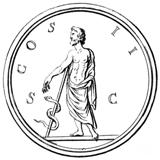
Asklepios
Rigorous Integrative Health Practice Research
The history of ASKLEPIOS is intertwined with the history of Integrative Medicine Research (before it had become mainstream, of course). The page describes the different phases of ASKLEPIOS and the status of the research at each moment in time.
A few months ago I was attending a swearing-in ceremony for a state Senator who is a friend of mine, and I was seated next to a medical doctor who was the CEO of a huge health network with several hospitals and thousands of doctors. I asked him what would it take to get him to look at Taijiquan and Qigong as a treatment for health issues. He answered "When it appears in the New England Journal of Medicine". At the time I didn't know it, but that article had already appeared. Another friend, Lijun Ma, later that week just happened to send me an email about these articles, along with the specific references. He said...
"I just wanted to mention this study and an editorial comment that were published in New England Journal of Medicine (NEJM) last year because this is the first time that studies related to Taijiquan and its health benefit were recognized and published in this highest level of Medical journal. "
This was great, I thought, but there were still two sides to this "win". At the time, one of my doctors still thought that
fibromyalgia was a "psychosomatic" illness and should not be treated the same as "real" illnesses.
I could see that many doctors would simply consider this tai chi solution, along with the disease itself, as hogwash.
What I wanted to see was randomized controlled studies for measurable items such as lowering blood pressure,
increasing lung capacity, increasing immune response, shrinking tumors, balancing thyroid hormones or blood sugar, etc., etc., etc.
[That is, if - indeed - these practices can produce those results reliably. Can they?]
Remember that I'd been intently searching for scholarly, academic, fully qualified medical studies on tai chi, qigong, and other integrative health practices ever since I had personally discovered that integrative health practices were the only answer to my persistant chronic back and neck pain from my 2002 automobile accident injuries. I'd found the answer for myself, but was it a fluke? Was it something that just worked on me because I'd been doing tai chi since 1990? Or would practicing tai chi, qigong, pilates, yoga every day (along with good nutrition, daily aerobic activities, and weekly massages) be a good solution for anyone in chronic pain?
In 2006 I presented some of my research at the first academic conference focusing on tai chi as a health treatment in Thunder Bay, Canada, at the International Taijiquan Forum.
It was the first time I'd met anyone else
doing this kind of work.
Three years later, I was fortunate enough to help out the Academic Committee of the the ground-breaking world-class International Taijiquan Symposium of 2009. The conference was ground-breaking
because it was the first time academic researchers and traditional tai chi teachers appeared together on an academic panel as we all tried to develop an understanding of why tai chi helps people who are chronically ill or in pain. At the time, there were several
experts who were the sources of studies on tai chi and qigong:
This was all good. But I believed that we needed to be extremely diligent regarding studies of these integrative health practices, and many of the studies shown above did not exhibit the highest quality that provided a preponderance of evidence. There are many in the medical community who are looking at integrative health practices these days - for many reasons not the least of which is that healthcare costs are skyrocketing, the population is aging, and chronic deseases rates are exploding. Since integrative medicine is one potential answer to pain relief without opioids, there is additional pressure to find a prescriptive method and a certification process to enable physicians to refer their patients instead of giving them side-effect-laden drugs.
Everyone is looking for answers - even in alternative, complementary, and integrative health practices (or whatever we want to call it). It should be everyone's goal to ensure that integrative health practices, when there is evidence that they work, should become part of the normal landscape of medicine.
Asklepios as an entity has its roots in group of people who were interested in Qigong and Tai Chi research, many of whom were on the National Qigong Association Research & Education Committee. In 2014 they agreed to work together to organize Tai Chi and Qigong research information (utilizing the already-existing resources listed in the sources page on this website) and adding/supplementing wherever there were gaps. The people who worked together on this project were:
While this group eventually stopped meeting regularly due to time and space constraints (darn those limitation!), the work that they started was carried on by Penny Klein and CJ Rhoads who continue doing and supporting high quality integrative medical research through this organization in a myriad of ways, including sponsoring symposiums and conferences, working on and publishing research, publishing a research agenda, and helping and supporting other researchers studying the topic of tai chi, qigong, meditation, and other integrative health practices that have shown promise for treating a wide variety of illnesses.
Luckily, we are not alone. As can be found in the sources page, there are many organizations who are taking up the gauntlet. We can only hope that the progress continues.